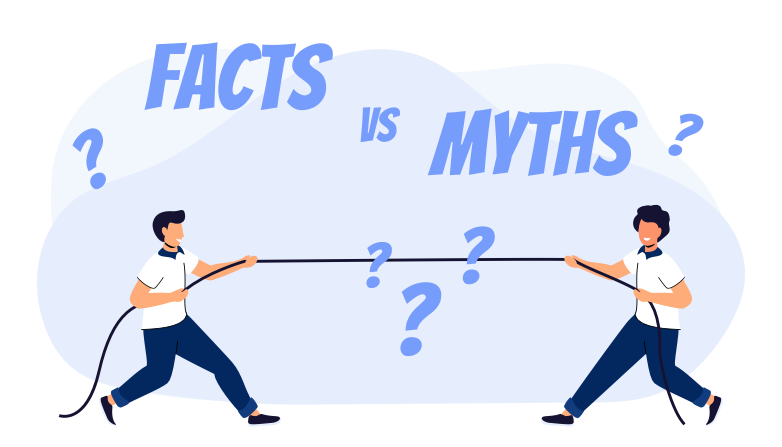
Since stigma can include stereotypes, it can lead to misunderstanding and misinformation. There are a lot of myths about mental health and illness. Below are some you may have heard, along with the facts.
MYTHS VS FACTS
MYTHS VS FACTS

Myths vs Facts
-
MYTH
Having a mental illness means you are “crazy.”
-
FACT
In the United States, 1 in 5 people will experience mental illness in a given year - that’s 20% of the population! What pops into your mind when you say the word “crazy”? Now think about the next time you walk to a store or a restaurant - would 1 in every 5 people fit that image? The word “crazy” means different things to different people - but in reality, mental illness is often a hidden struggle. By talking about it, you may learn that these experiences are more common than you think and that you don’t have to struggle alone (More Info).
-
MYTH
Mental illnesses are life-long. Once you receive a diagnosis, you’ll always have it.
-
FACT
The idea that mental illnesses are “chronic” and that you will never get better is outdated, from a time where the only treatment options were medications with severe side effects, and “insane asylums” with frequent human rights violations. Having a mental illness is certainly difficult and some people may find they have symptoms that wax and wane over time. However, most people who experience mental health difficulties can and do get better (More info).
-
MYTH
Having a mental illness means there is something wrong with your brain.
-
FACT
A combination of factors can lead to the development of mental illness, including life experiences (such as trauma or experiencing abuse), family history of mental health problems, and biological factors (such as genes, injury, and medical conditions). We are still learning about all these contributors, and there is no conclusive evidence that having a mental illness means your brain is “wired wrong.” Most of the time, there is no single cause of mental illness.
-
MYTH
Getting help for your mental health means that you are weak.
-
FACT
This is a dangerous myth because it may discourage people from getting support when it could benefit them. Because stigma around mental health and illness can be so strong, getting help can take courage. Getting help simply means that you want support, and are willing to take steps to get it. It also means that you have a better chance of making some positive changes.
-
MYTH
Having a mental illness makes you dangerous or unpredictable.
-
FACT
Research tells us that individuals with diagnosed mental illnesses account for only 3-5% of violent acts in the United States (more info). Research also tells us that the relationship between mental illness and violence weakens when we account for other factors commonly associated with criminal behavior (more info). Much of what we believe about mental illness and dangerousness or violence are negative stereotypes that we have learned through popular media that perpetuate stigma, including television and movies. For example, research has found that news media reporting on mental illness tends to focus too much on a direct link between mental illness and violence. (More info)
-
MYTH
Mental health services are only for people with diagnosed mental illnesses, or “severe” disorders.
-
FACT
Many people experience mental health challenges without having a diagnosed mental illness or so-called “severe” disorders. Everyone experiences problems with depression, anxiety, and stress at some point in their life, and for many of these people, mental health services could help them to develop coping skills, increase their understanding of themselves and others, and prevent future challenges.
-
MYTH
You shouldn’t need to tell others about your problems to feel better.
-
FACT
Talking with others can give us a new perspective on our problems, and also help us to problem-solve. Bottling up emotions doesn't make them go away - in fact, it can make things worse. The pressure may lead to increased stress and even physical concerns, such as head and muscle aches, increased blood pressure, and tension. It may also lead to feelings of anxiety and depression, and be harmful to our relationships.
-
MYTH
Talking about feelings means that you are “less of a man.”
-
FACT
Unfortunately, due to social pressures and how we grow up, boys and men can be less likely to express their feelings to others. This may be especially true within some communities. In many Latin cultures, machismo relates to exaggerated attitudes and behaviors around male dominance and strength, and includes the idea that expressing feelings and being vulnerable are unmanly. The fact is that having emotions is a part of being human, and holding emotions in can lead to mental and physical problems. It is ok for men to cry, and most men do sometimes
-
MYTH
Some things should just be kept private.
-
FACT
You may have heard about “not airing dirty laundry”, which has to do with not discussing personal or family problems outside of the family or the community. Not airing dirty laundry is done to protect privacy and save face. Family can be extremely supportive, but sometimes talking to an empathic, non-judgmental person outside your family can bring added benefits. This is especially important if you're having family challenges. A professional will keep what you talk about confidential.
-
MYTH
Mental illness happens because of personality weakness and/ or character flaws.
-
FACT
Having a mental illness has nothing to do with being weak, lazy, or flawed. The causes of mental illness are complex and may include a combination of biological, social, and environmental factors. It is impossible for us to control all of these factors, but there are steps we can take to improve our mental health. (More info)